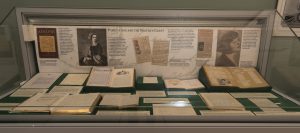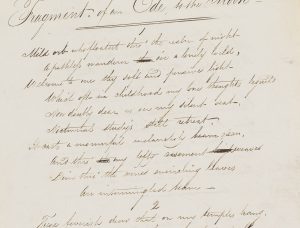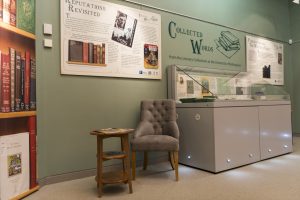February 20, 2018, by Sarah Colborne
Putting Creative Writing Back On The Syllabus
This is a guest post by second-year English student Bertie Beeching.
“The Manuscripts and Special Collections archive,” I recalled reading to myself when scanning through placement opportunities. A small and contemptuous part of my brain made me envision a small, dark room filled with filing cabinets. You can imagine, then, how overwhelming it was to be shown around the enormous manuscripts store; it felt as if I was re-creating the last scene in Raiders of the Lost Arc. In addition to this surprise, the whole process was extremely enjoyable. The bus service from Portland made it very easy to integrate placement work with my course. Every staff member was approachable, friendly, and did an excellent job of making me feel welcome, making any group discussions we had a relaxed and comfortable process. I also appreciated the chance to work independently as well as in a team, since this is often a practical skill all employers seem to want an example of. Furthermore, when presenting my independent work to the other staff, any criticisms that were made were always constructive, so I felt very confident that any ideas I suggested would be appreciated.
The task was advertised as the opportunity to create activities for a ‘discovery day’ for local schoolchildren by drawing from literature of Nottingham’s past writers, such as D. H. Lawrence. This was split into two parts: a creative writing and editing workshop, and an activity based around Lakeside’s Collected Words exhibition (which used artefacts based on materials from the archives). I was keen to take on the former part, as I had a lot of experience in creative writing from hobbies and my course. Along with the archive staff, I was supported by the University’s Widening Participation Team, whose aim is to give those from less advantaged backgrounds in education the opportunity to engage in types of learning that previously they might not have had the chance to. They deliver projects, such as the discovery days, for schools in areas where children would not typically progress to university. These provide the opportunity for the school children to visit the University and interact with staff and students. The Team offered useful advice, specifically working with schools, as well as supplying the practical materials which I had requested. By the end of the placement, I had created several activities for the schoolchildren, which were spread evenly throughout the presentation that I presented during the event. I was even able to sneak memes into the PowerPoint! Despite my familiarity with creative exercises, there were also several elements that I did not expect I would have to deal with, such as Health & Safety or organising materials for the event. This actually turned out to be very useful, as I then gained a little experience in how to overcome various issues relating to those elements.
Ultimately, the whole process was enjoyable, but nothing quite compared to the event itself. Not only were the children incredibly enthusiastic about the exercise (and the memes used in the slides) but I was given a huge amount of support from the archive staff on the day itself. It was a shame in many ways that the event was only on for one day. Perhaps it was particularly enjoyable as I had gone from my course’s level of refined analysis of text to more emotional responses from the children; I recall one story that was written by one of the pupils was greatly liked because “it had lots of colour in it.” All in all, I thought it was great to be part of giving pupils a breather from academic English – I’m sure many of us have nightmares about learning Shakespeare at school – and just appreciate the ability to create as well as simply enjoy reading. I can’t stress how much I enjoyed joining the team, if only for a while, and how it has helped me bulk up my CV, which will no doubt be useful in the future.
The Collected Words exhibition was open at the Weston Gallery, Lakeside Arts Centre from September to December 2017. A version of the exhibition is available online. Manuscripts and Special Collections host around ten student placements every year from a range of different departments and schools. More information about the archives and special collections of printed books at the University of Nottingham is available on the Manuscripts and Special Collections website.
No comments yet, fill out a comment to be the first




Leave a Reply